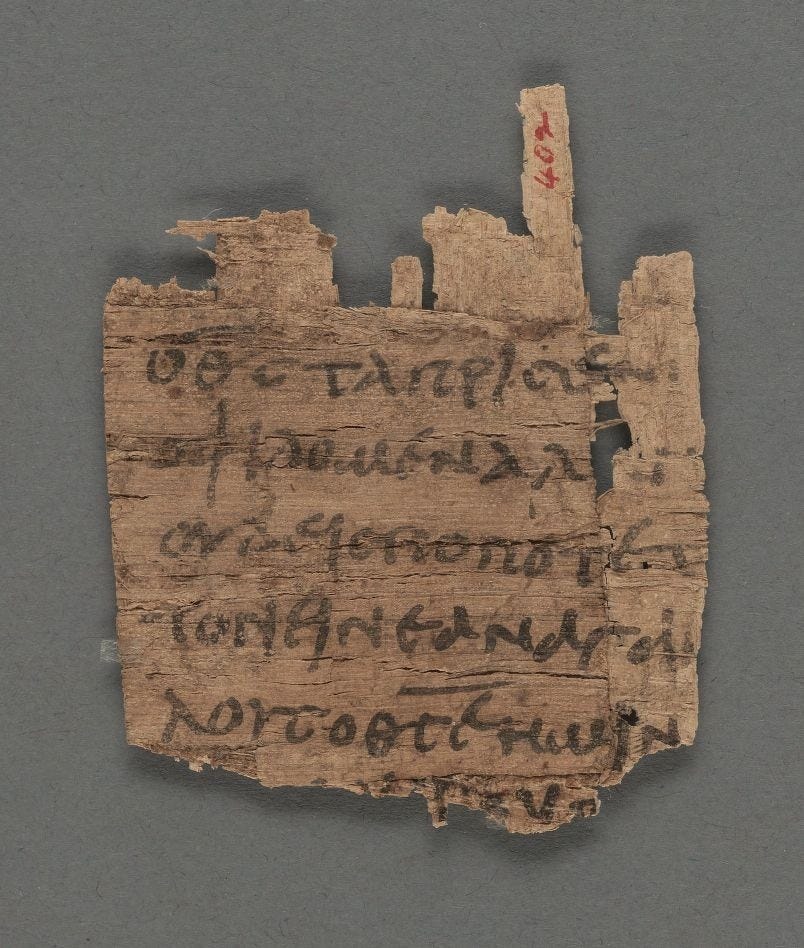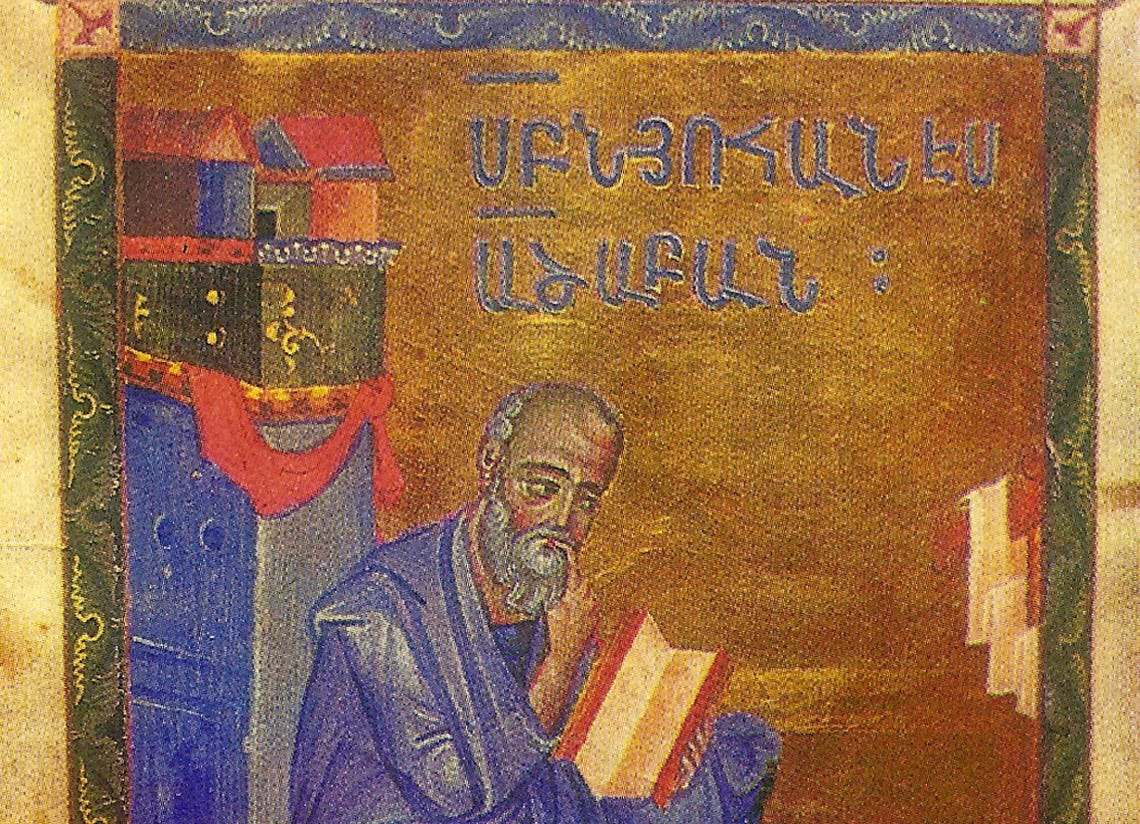The Word of Life
Reflecting on Brian Zahnd’s sermon about John’s first epistle
This is the first of two sermon reflections for Sunday, November 2, 2025. In this essay I share my reflections about Brian Zahnd’s sermon on the first epistle of John.
image: Papyrus 9 - P. Oxy. III 402 - Houghton Library MS Gr SM3736 - First Epistle of John, 4,11–12,14–17
John the theologian wrote this letter toward the end of his life, likely in Ephesus. He wrote this letter to the churches of Asia Minor, as a way of addressing the believers facing backlash from the culture around them, which denied the incarnation of Jesus. Rather than directing this letter a particular church, John intended this letter to address several churches, and the letter likely circulated to all the churches of the area. This letter predates the book of Revelation.
(1 John 1:1) :: The Word of Life :: We declare to you what was from the beginning, what we have heard, what we have seen with our eyes, what we have looked at and touched with our hands, concerning the word of life…
John begins his epistle echoing the opening of his gospel. For John, the Word, Logos, Λόγος, begins all.
John 1:1-3 :: The Word Became Flesh :: In the beginning was the Word, and the Word was with God, and the Word was God. 2 He was in the beginning with God. 3 All things came into being through him, and without him not one thing came into being.
Jesus is the Word of G-d and He is the Word of Life. The Bible serves as a secondary Word of G-d, in the it points to Jesus. Eternal life means Jesus, a person, and not an abstracted eternal state of being. Jesus is the Word made flesh. Communion is eating the ultimate sacrificial offering—the sacrificial offering to end all offerings. Jesus necessitates sacrament —a material means by which we participate in heavily realities. Through the sacraments we participate in the death and life of Jesus. The Bible serves as another material means through which we encounter Christ.
44 years ago today Brian Zahnd founded the Word of Life church in St. Joseph, Missouri. WoL church embodies and channels hope, not despair, and not cynicism. WoL church avoids the negative, there’s already a lot of that in the world of churching and church culture. Pastor Zahnd leads a community focussed on the hope of the Word of Life embodied in Jesus Christ. Jesus represents atonement, He represents propitiation. Jesus is ἱλασμός, transliteration hilasmós, metonym for mercy seat, the gold lid of the Ark of the Covenant. Jesus is the mercy seat for the whole world. Jesus came not to condemn but to save. John uses the word “world” in his gospel and epistles 102 times. G-d loves the world … love not the world — how do we reconcile these two statements about the world? What world does G-d love? He loves the cosmos of His creation. What world doesn’t G-d love? He doesn’t love the world system embodied in and represented by Babylon, the archetype … akin to Mordor.
1 John 5:19 :: We know that we are God’s children, and that the whole world lies under the power of the evil one.
In Genesis, the evil one tempts Cain, who kills his brother, and gets punished by G-d through exile, and then the founds the first city. The first murderer founded the first city — an entity embodying self sufficiency from G-d, in which the ethos of violence and bloodshed exist as an anathema to the ethos of the garden of Eden. Cain allowed the evil one to plant in his heart the seed of a false impression of G-d. He loved and desired all the things G-d does not love and his poisoned heart drove him to kill his brother.
1 John 2:15-16 :: 15 Do not love the world or the things in the world. The love of the Father is not in those who love the world; 16 for all that is in the world—the desire of the flesh, the desire of the eyes, the pride in riches—comes not from the Father but from the world.
We live in a world that sits under the shadow of the evil one. We live in Mordor, where pride, greed, and lust reign. We cannot harness Mordor for good—it’s Sauron’s One Ring. Religious ambition for political power imagines that the church can harness the systems of pride, greed, and lust for good. When church tries, it becomes the world, it does not change the world, the world transforms the church into pride, greed, and lust. G-d doesn’t call His church to harness the world. He hasn’t tasked the church to reappropriate the evil engines of pride, greed, and lust. He’s called the church to share life through Jesus in faith hope love. When we move from individual-centred ethos to community-centred ethos, there we find Life.
artwork: Armenian icon of the Apostle and Evangelist John the Theologian, 13th century by the Armenian manuscript illuminator Toros Roslin
Pastor Zahnd described a word association exercise at last week’s School of Theology in Atlanta. What do you think of when you hear the word church? BZ thinks of home, life, joy, struggle, house of the Father, flock of the Son, eddy of the Spirit. Eddy of the Spirit, though, reader. Wow. What’s an eddy? Eddy, (noun) :: a circular movement of water, counter to a main current, causing a small whirlpool. Counter to a main current! That’s the Holy Spirit, that’s Love, the alternative flow, it’s the thing that helps us resist the power of the One Ring.
1 John 4:7 :: Beloved, let us love one another, because love is from God; everyone who loves is born of God and knows God.
G-d = love. Love > theology. Jesus is what G-d has to say.
1 John 5:20-21 :: 20 And we know that the Son of God has come and has given us understanding so that we may know him who is true;[f] and we are in him who is true, in his Son Jesus Christ. He is the true God and eternal life. 21 Little children, keep yourselves from idols.
Little children, keep yourselves from idols. Yes, reader, we can think of ourselves as little children of G-d. And we must resist the idols. And we must keep ourselves away from idols. What’s an idol? A false idea about G-d. Jesus is not the idol. Jesus is the icon. G-d is like Jesus, G-d always has been like Jesus, we haven’t always known this, but now we do.




